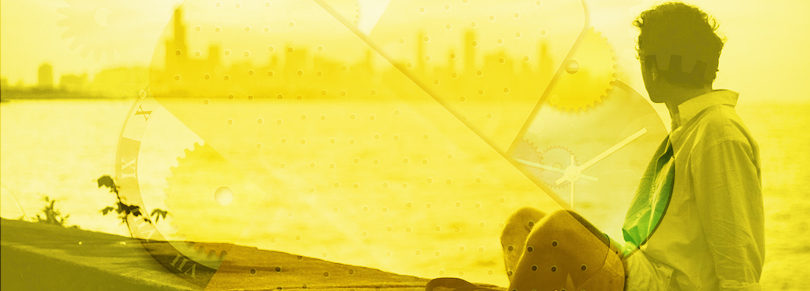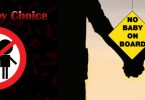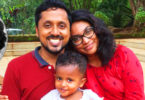From an early age my relationship with my father was more often tumultuous than smooth sailing. I did my fair share of raising the storm with being a son who just did not seem to be able to measure up to expectations. I do not remember developing any particularly bad habits – I kept away from smoking, drinking, drugs and the other things that seemed to define poor character in a child. I loved to read, play and watch movies. I did not get involved in rebellious or ‘bad behavior’ in school or society and so was labeled a ‘good boy’.
However, I was rather shy and diffident except with a small peer group. I craved peer respect. I evolved a very strong code of keeping one’s word to win my friends trust. My parents would have loved me to be more studious, full of general knowledge and many other characteristics that were no doubt good and honorable. Much to their disappointment, I struggled quite bit with my academics. I just could not be motivated to study as hard as required or as was expected. So I slipped into a peer group that I felt more comfortable with – a group that was rebellious, had plenty of time to play and watch all the latest movies.
It was no surprise that my choice of friends made my parents angry, particularly my father who was ever ready to fly into a rage. My primary feelings, most of the time, were of outrage at unjust punishment and fear of the next discovery that would lead to more punishment. One incident that sticks in my memory is when a close friend ran away from home. I happened to be home alone as the rest of my family was away for a couple of days. One evening my friend had a particularly bad situation with his father and so decided to run away.
He turned up at my place knowing that I was alone and wanted to stay over. I agreed to give him safe harbor knowing fully well that his parents were searching high and low for their missing son. The next day he went over to another friend’s home and eventually decided to return to his own place to be greeted with relief and celebration. When my parents heard about the adventure, my dad came down heavily on me for the role I played. At the end of the whole sorry saga, my friend and his dad seemed to have become particularly close but the gulf between me and my father widened.
Time healed the emotional wounds as it did in most other cases. But today I ask myself, ‘is time really the best healer?’
No doubt time does play a role. But in my opinion, using time as the only healer will only cause scabs to form over the wounds. These scabs will never be fully hidden from the mind’s eye and are likely to rupture and bleed all over again. All the feelings that I captured from memory are one sided – my own perspective. When I was just fifteen, my father passed away to a cardiac arrest.
None of us had even hint of the impending end and so I never did get an opportunity to understand my father’s viewpoint. My mother, a loving, forgiving, extremely hardworking and praying person had to put up with my indifferent behavior for a few more years. With the passage of time and as a fruit of my mother’s prayers, I developed a sense of responsibility and began to put together my life.
My own faith in God grew and shaped me during this period. Fast forward a few years to move on to the second part of my story. I am now married to a wonderful woman and we are blessed with two great kids. My son, the elder of the two is a quiet reserved person while my daughter’s presence is written large and colorfully all over our home. We parent our kids with openness and the freedom to express themselves.
This pattern is both an unconscious product of our childhood experiences with our parents and deliberate decisions based on our evolving ideas of good parenting. We give both our children freedom of choice in friends and with money. Whenever we pray for them, we never forget to pray for a sense of responsibility and strength of character for our children.
We are very connected with them be it in their studies, extra curricular activities with friends, their choice of books, Facebook and internet activities. My childhood experiences left me with lurking fears of how my relationship with my son would turn out. And so I was a bit guarded in how I dealt with him. This does not mean we gave them absolute freedom without boundaries.
I have disciplined both of my kids and made them wait for things they wanted, when we felt the time was not yet right. After most incidents of disciplining, we have tried to explain why it was done. One thing I have taken particular care to do is to admit when I am wrong. I enjoy my relationship with my son. More enduring, by far, are the memories of the happiness and involvement with his achievements, than the points of friction.
I must confess though that this again is my own view point; I have not yet asked my son about what his own thoughts on our relationship are. When I cast my mind back on my relationship with my father, I cannot but feel sorrow at missed opportunities to build good memories. From the love I feel for my son, I know now that my father loved me deeply and was hurt when I did wrong. It has taken me the joy of parenting to discover this.
If God has indeed created us in his image, then the love we feel for our children, which we only partner to create, must be in some measure akin to the love he has for us. Life is fleeting and broadly speaking none of us can predict, well in advance, how long we will live. Relationships and the fruits it bears lives on, even after one person in the relationship is no more. Time helps to heal but you can and must act directly to heal hurt relationships.
When forgiveness and clearly communicated feelings can bring closure and takes a relationship full circle, why wait a generation to experience this happiness?
I still do occasionally slip back into thoughts of ‘what might have been?’ But the assurance that a loving God will want complete healing and restoration for every relationship is encouraging.






Leave a Comment